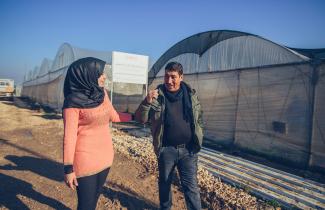The Strawberry King
A Palestinian farmer shares his secrets to success: love, technology, and a little help along the way
Story by Sahar Kalifa, USAID and Kelly Ramundo, USAID | Photos and video by Bobby Neptune for USAID
June 2015
ONE OF TWENTY
Strawberries are not new to the West Bank. But growing them is.
Osama Abu Al-Rub is one of only 20 strawberry farmers from a population of nearly 2.5 million.
He owns a farm in Qabatiya, in Jenin Governorate, with his wife Ezdihar and his daughter Hanin.
“My family is a blessing from God,” he says.


APPLE (OR STRAWBERRY) OF HIS EYE
Hanin is 20 years old and studies agronomy at the local university, following in her father’s footsteps.
The success of the strawberry farm has allowed Osama to send Hanin to university.
“I am so proud of you for continuing your studies,” he tells her.
“I admire my dad for his kindness, and because he can do anything he sets his mind to,” says Hanin.
By all accounts, they have the best strawberries around.


BUT NOT AT THE BEGINNING
Osama started growing strawberries six years ago, in the traditional way.
He planted his strawberries in the ground, where they were susceptible to the whims of nature, to poor soil conditions, to pests, and to imprecise irrigation.
His yields were not that good. His strawberries were not that delectable.
In 2013, Osama became one of a handful of West Bank growers to receive USAID support to boost the strawberry sector and other targeted parts of the Palestinian economy.

HANGING ON
With USAID assistance, Osama lifted his fruit off the ground. He started using greenhouses and a special, isolated soil.
This protects the strawberries against the elements and allows him to better monitor the nutrients that feed his crop.
He uses just a fraction of the pesticides he did before.


OK COMPUTER
He also began using computerized irrigation which dramatically decreases the amount of water he uses - a precious resource in the West Bank.
“All plants need taking care of, and strawberries need more care than any other plants,” Osama says.

FLYING OFF THE SHELVES
Osama and Hanin sell their strawberries to local fruit venders throughout the region.
And they can barely keep up with demand.
“Strawberries do grow in our area very well and we have proven that.”
Osama is proud of what he grows. He says his strawberries stand out from the competition.
“The ones in supermarkets rot on the same day if they don‘t get sold. Our strawberries live longer because they haven‘t been treated with chemicals.”







“THE MOST WANTED FRUIT”
Jihad Al Shalabi is the 25-year-old co-proprietor of a fruit shop in Jenin that purchases Osama’s sweet fruit.
He and his cousin Ala’a buy around 10 cartons each day during harvest season.
The cousins can barely keep Osama’s strawberries on the shelf.
“It’s the most wanted fruit.”
PAYING IT FORWARD
Thanks to his new knowledge and technologies, Osama’s strawberries are flourishing.
His farm is a model for the next generation of Palestinian farmers and agronomists.
A group of Hanin’s classmates at Al-Quds Open University visit the farm at least once a term to study the modern methods that Osama uses to grow his most lucrative crop.


HONESTY AND CLARITY
Each day at lunchtime, Osama and his family eat together as a family.
“We understand each other and our life is based on honesty and clarity,” he says. “We work in our field and we love our work, we love each other.”


DREAMS COME TRUE
They also love strawberries and what they might mean for the West Bank and beyond.
A thriving agriculture sector helps boost the economy and provides more job opportunities.
“The strawberry production in my farm means that I contribute to the national economy,” says Osama. “I feel so special.”
He could not be prouder of Hanin for pursuing the family business.
“I will do anything to make your dreams come true,” Osama tells her. “Especially with your studies.”


About This Story
In the West Bank, agriculture employs around one out of 10 people but is still an underdeveloped sector. USAID, through its Compete project, helps Palestinian farmers introduce new crops with high export potential, including strawberries, red potatoes, broccoli, mangoes, fruit trees and grapes.
Osama Abu Al-Rub is one of only 20 strawberry farmers in the West Bank. In 2013, he began receiving USAID assistance to grow more and better strawberries with less water, fertilizer and pesticides. USAID provided hanging systems and soilless culture; introduced computerized, automated irrigation systems; and connected Osama with a Palestinian agribusiness.
Now, even though only half of Osama’s strawberry plants are grown with these modern methods, they make up around 80 percent of what he harvests and sells.
In two years, the Compete project trained 1,700 Palestinian farmers; and in 2014, the Palestinian agriculture sector increased the value of exports by $24 million compared to the previous year. Along with agriculture, the Compete project also targets growth in tourism, information communications technology, and stone and marble.


